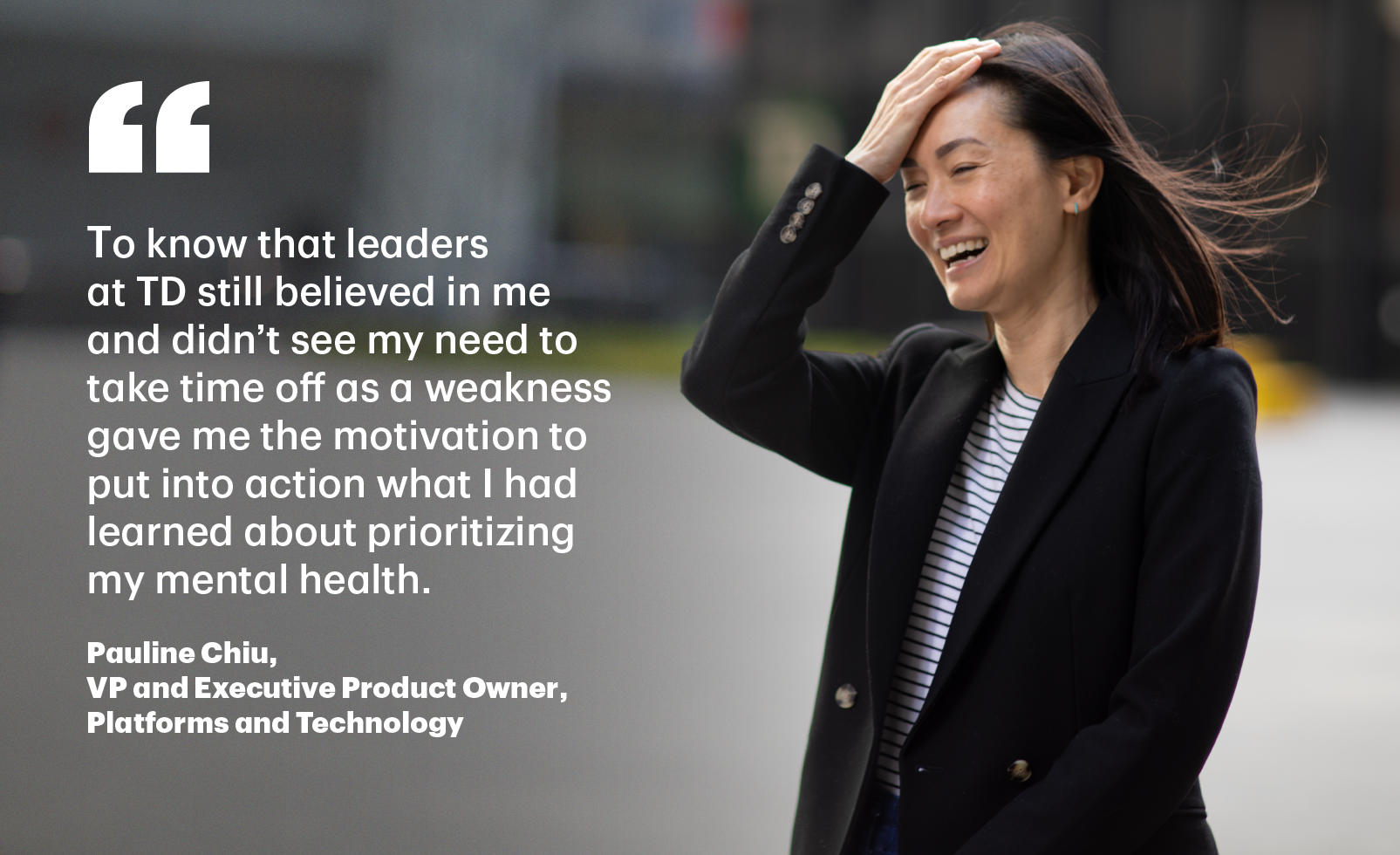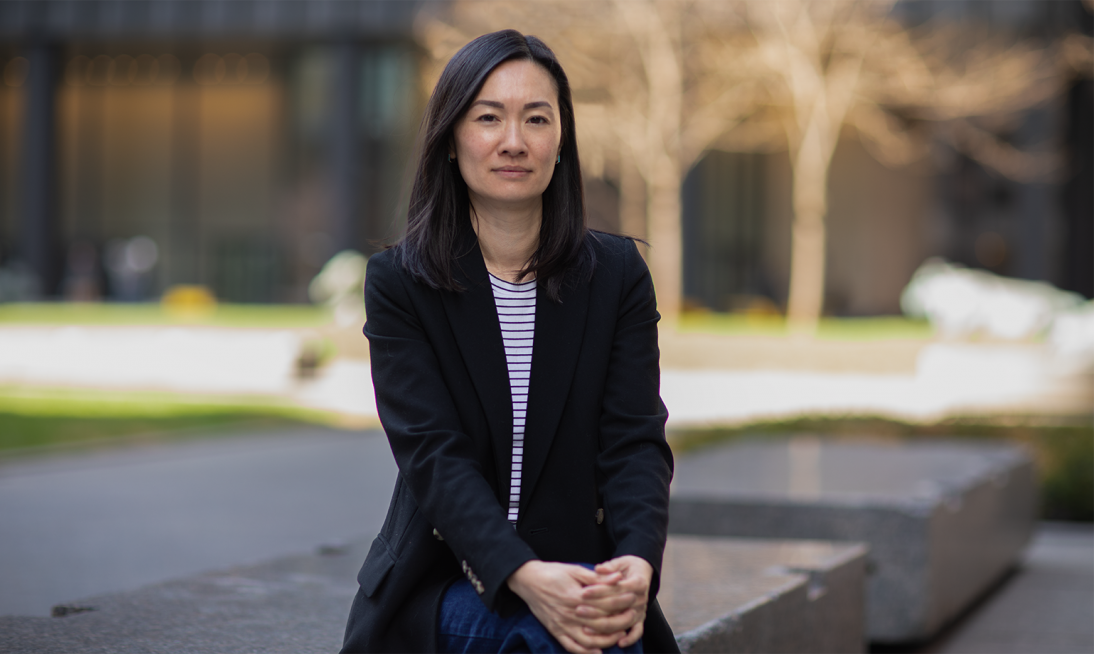It was 2017 when I hit a wall.
Burnout creeps up on you. Sometimes you don't know you're suffering from it until the problem becomes too big to ignore.
I'm a perfectionist and people-pleaser by nature. When I graduated from university, I joined a consulting firm. I learned there that you make your mark by delivering a great product for your clients, but also that long hours were expected to ensure we exceeded our clients’ expectations.
I joined TD in 2008 and received great opportunities to progress in different roles and lines of businesses — I had also been lucky enough to have had incredible leaders to work with. I remember many mentors telling me that as I progressed in my career, it would become increasingly important to focus on prioritizing the things that really matter. It also meant I just wouldn't have time to do it all.
Despite that wise advice, I still felt I could do it all.
I kept working at the same pace, asking for more work, taking on more, and doing my best to make sure I was exceeding expectations. Everything was a priority.
Trying to do it all myself
Two years later, in 2010, my daughter was born. When I returned to work from parental leave, I was promoted into a larger role. Still, I kept up a fast pace with a large workload, and I started feeling worn out. But I told myself I just needed to show more grit and so I pushed through.
Sometimes I would work the entire day before I realized I didn’t eat lunch or had barely moved from my desk. I always prided myself on having figuratively broad shoulders, taking on a lot at home or work, not asking for too much help from others, never showing any cracks. Part of this attitude was likely a result of my upbringing: I grew up in a household where my parents always told me to work hard, never be too vocal, show grit, and work through things on your own.
I felt like asking for help was sort of a weakness.
I didn't have the proper mental tools and skills to manage the changes going on in my life. I struggled to keep up with work and home life demands. On the surface I was performing, I didn’t show the wear and tear. I hid it very well. I kept receiving accolades at work.
But I was like that old saying about a duck, "calm on the surface but paddling like the dickens underneath."
By 2017, the cracks were starting to show. While I was still performing well at work, I wasn't doing well at home. I wasn't sleeping well. I wasn't doing a good job of balancing and managing the various aspects of my life. I was neglecting my personal well-being and mental health. I hid my stress from my colleagues and leaders. I hid my exhaustion.
Even when I was home, I wasn’t present. For Family Day, my daughter drew some pictures at school and filled in some blanks the teacher asked her class to complete as a gift to their families.
For the moms, the question my daughter was asked to complete was "My mommy likes to ____". And my daughter completed her drawing with, "be on her computer."
That was a low point for me.
So, over that Family Day long weekend, I had an honest conversation with my husband, and we decided together that I needed to take some time away from work.
I went to my VP and tried to resign. I thought it was the only option for me. But what happened next made me feel so grateful to work for an organization like TD.
My leaders asked how they could help. It didn’t even occur to me that I could ask for help. I was worried it would be seen as a weakness. After much discussion and laying out a few different options, I decided to take a leave of absence.
I ended up taking almost one year off and I didn’t waste the opportunity.
I spent the first three months decompressing. Then I started to focus on my mental and physical well-being. After that, I started to learn and understand more about myself. I knew I loved my career, but something had to change before I went back to work. I had to unlearn and relearn how I approach and manage my work.
What I learned about myself was eye opening. I realized I was working on a number of different tasks and projects at any given time, but not everything needed to be treated as my top priority. By taking on everything, I was burning out my team, I wasn't stopping to re-fuel and re-energize after periods of busy times, and when things really got hectic, I just didn't have the necessary outlets to reduce that stress.

Prioritizing Care
It's inevitable that work has ebbs and flows, and ups and downs in terms of workload. But the key is how you recover and get yourself re-energized for the next "up."
Has my job gotten easier? No. In fact, TD promoted me from Senior Manager to Associate Vice President after I got back from my leave.
To know that leaders at TD still believed in me and didn’t see my need to take time off as a weakness gave me the motivation to put into action what I had learned about prioritizing my mental health so that I could help TD meet its goals while meeting my own goals.
Today I'm a Vice President and life at work and home feels great. I got here by putting into practice what I learned about caring for my own mental and physical health, and getting the support from leaders at TD who believed in me.
I share my story because I know burnout is real. Not everyone is lucky enough to take a year off from their job and be welcomed back with open arms, that I know. But what I learned is that we do have more control than we think to make things better and not only is self-care essential, but so is care.
For anyone out there in a management position, I would encourage you to create a culture of care so that your employees feel they can be honest about burnout. Check in with your colleagues and those around you to see how they are doing — you'll be surprised how that can help people open up.
Finally, be honest with yourself about when it might be time to ask for help.
One day at a time
I'm still a work in progress, but I'm encouraged.
I think the conversation is getting more and more open now on stress and burnout. At TD, we're talking about mental health openly as it’s a big part of the Bank’s culture of care. I share my story to let people know they aren’t alone, and that asking for help isn’t a weakness.
